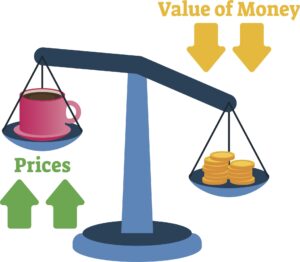5 Tips To Help You Manage Your Money During High Inflation
Have you purchased diesel or petrol recently?
Do you do the weekly shop for the house?

Yep, unless you’ve been asleep for 6 months you’ll have noticed the hike in prices.
Inflation is here.
With a bang.
Everything is more expensive.
But what can you do to help yourself navigate this landscape?
Here are 5 simple tips.
What is inflation?
Firstly, what is inflation?
Simply, inflation is the general price increase in goods and services in the economy.
Typically caused by an imbalance in supply and demand.
Let’s take Covid as an example and keep it simple.
Covid caused all sorts of issues for supply chains.
Yet households were sitting on money that was stockpiled.
When lockdowns were lifted, we all went back into the economy.
Spending money.

The demand was greater so suppliers could increase costs.
That is it in its simplest form.
Add into this low bank interest rates and it means our money in the bank also loses value.
And we feel the pinch.
Make a budget
The dreaded word – budget!
No one likes this word!
However, when I say budget, I don’t mean restricting what you spend, not initially anyway.
Firstly, just be conscious of where your money is going.
Map out your spending.
Clearly identify where you are spending money.
Subsequently, if you’re overspending in one area, then you may need to restrict what you spend.
Click here and grab our free budget template.
Reduce Costs
Without a doubt, utility bills have increased with inflation.
We can clearly see the hike in energy costs.
Gas, electricity and oil.
When your contract is up, review suppliers.

Undoubtedly, you’ll save money.
Importantly, the same goes for other bills.
Broadband and TV, insurances.
I myself used to just renew the car and home insurances with the existing provider.
Back in 2019, I made a conscious decision to review them.
Unquestionably it worked to my advantage.
This all takes time, set aside an hour one evening or a Sunday.
Note down all your bills and what you pay.
That will give you a base to work from as the renewals come in.
Pay off crappy debt
Good debt is the equivalent of say, your mortgage.
Crappy debt is high-interest short-term debt.
Think loans you have, also credit cards.
High-interest stuff.
Don’t just pay the minimum amount required.
Without a doubt, it’s in your interest to take charge of this and get it clear.
Unquestionably, the only winner with this type of debt is the lending institution.
Direct extra resources, no matter how small, to clear this.
Maintain Emergency Fund
We should all have an emergency fund.
Think 3-6 months of expenses.
Ideally 3-6 months of your net after tax income.

It’s important to try and maintain this.
Unfortunately, just because inflation is here, emergencies don’t stop.
As always retain this in the bank or credit union.
Put spare cash to work – Invest!
Right, so you’ve no crappy debt and you’ve got your emergency fund and meeting your expenses.
Now it’s time to open an investment account.
Investing will help you to grow your money.
Importantly, help your money keep pace with or even beat inflation.
If we’re holding more money than we need to in banks or credit unions, it’s simply losing value.
Inflation is just consistently eroding its spending power.
By investing it, it will work harder for you.
New to investing? Read our ‘Investing for Beginners’ guide.

Existing Investor – Stay the Course!
Alternatively, if you’re an existing investor, current markets could be causing you concern.
Equity markets are down Year to Date (YTD), bond markets are also down.
When volatility kicks in and our investments drop in value, emotions can take over.
You may second guess yourself about your investments.
Volatility will pass.
It’s a natural concept of investing.
Unfortunately, we can’t participate in long-term market gains without short-term volatility.
Investors can be tempted to make 5 common mistakes in volatile times, learn more here.
Worried about your existing pensions or investments? Book a call below.
Review Your Investments or Pensions
Summary
So there you have it.
Inflation is, without a doubt the silent killer of our money.
An unwritten tax.
Usually silent in that we usually hear little about it, on the other hand, in 2022 it’s all we’ve heard, so not so silent at the moment.
Clearly, it can be difficult to navigate.
Nevertheless, I hope the above points have given you a sense of what direction to move in.
Even so, if you’re still uncertain, worried, read on and schedule a call.
How we help
Definitely, inflation is here.
How long for, no one knows?
Even so, we can control what we do about it and what steps we take individually.
If you are still in need of a bit of guidance, let us know.
Get in touch
Either email me, at francis@fortitudefp.ie or request a callback.
You can get me on 086 0080 756 or access our diary here and book a call at your convenience.
Why not visit our insights.
A multitude of information on various financial subjects covering all aspects of saving, investing, financial planning, protection and pension advice.


Our blog posts are intended for information purposes only and should not be interpreted as financial advice.
You should always engage the services of a fully qualified financial planner before entering any financial contract.
To discuss engaging the services of Fortitude Financial Planning please email us at info@fortitudefp.ie.
Fortitude Financial Planning Ltd will not be held responsible for any actions taken as a result of reading these blog posts.




 Production
Production